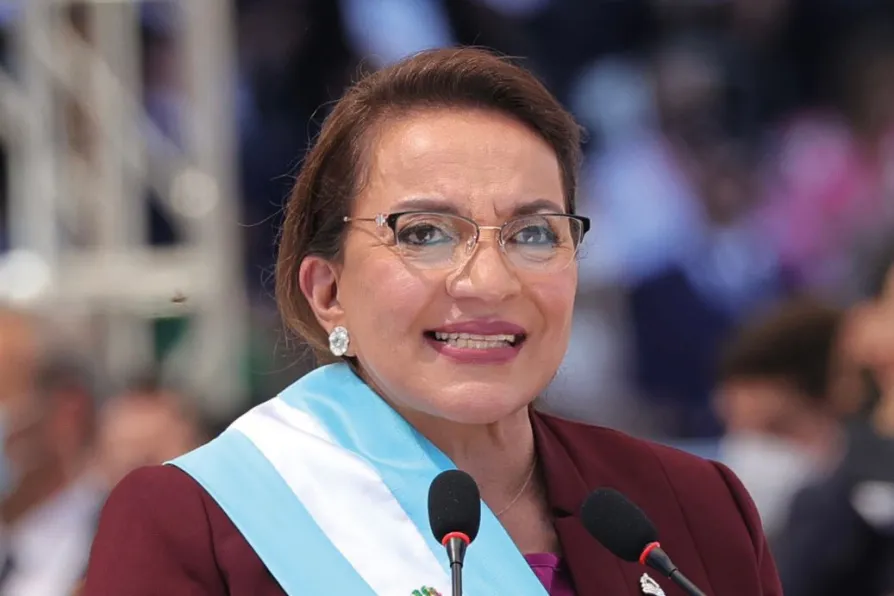As tens of thousands return to the streets for the first national Palestine march of 2026, this movement refuses to be sidelined or silenced, says PETER LEARY
The US is desperate to stop Honduras’s process of social and democratic change, writes TIM YOUNG

 Pic: Official Photo by Simon Liu/Office of the President/Creative Commons
Pic: Official Photo by Simon Liu/Office of the President/Creative Commons
HONDURAS’S ruling Liberty and Refoundation Party (Libre), in office since President Xiomara Castro’s runaway victory in the 2021 presidential election, is gearing up for elections later in November amid warning signs that the government is in danger of destabilisation stemming for the US.
In August, the Honduran authorities thwarted a plot to assassinate former Honduran president and Libre Party co-ordinator Manuel Zelaya and overthrow President Xiomara Castro. Three arrested men face charges of terrorism and attempted murder as part of a conspiracy to depose President Castro, destabilise the country and prevent the 2025 general elections from taking place.
Plans to assassinate progressive political leaders in Honduras are not unknown. Former president Zelaya, elected in 2006 after decades of right-wing rule by defeating the conservative National party candidate Porfirio Lobo Sosa, has revealed there were plans to kill him in 2009 before he was overthrown in a military coup and forced into exile. The coup was widely condemned by governments across Latin America, the EU, and the Organisation of American States, but not by secretary of state Hillary Clinton for the United States.
Following Zelaya’s ousting, successive right-wing Honduran governments continued to be supported by the US, despite evidence of electoral fraud, widespread corruption and the criminalisation and repression of political dissent, including assassinations of activists.
Those right-wing governments — serving foreign, and in particular US, interests in the region — increased poverty, marginalised communities and spawned widespread violence and repression.
Castro’s victory for the Libre party in 2021 represented a turn in the tide. Committing herself to pursuing social justice in the distribution of wealth and in national income, she introduced progressive economic policies such as promoting a fuel subsidy for the poor and abolishing special economic zones, banned open-pit mining and reversed previous policies granting concessions in the exploitation of rivers, hydrographic basins and national parks.
In foreign policy, she restored diplomatic relations with Venezuela and opened them with China and engaged with the ALBA-TCP (Bolivarian Alliance for the Peoples of Our America-Peoples’ Trade Treaty) project of political and economic integration of Latin American and Caribbean countries to reduce Honduras’s external dependency.
Much is therefore currently at stake in this coming election, especially given the United States’s history of destabilising governments in the region, especially at this time those that are supportive of Venezuela.
Last year, President Castro suspended the US-Honduran extradition treaty, prompted by hostile statements by the US ambassador, Laura Dogu, criticising Honduran government officials for meeting Venezuelan government members sanctioned by the US.
Some high-ranking military officers — almost certainly linked to the US embassy — hoped to use Dogu’s threats to press the chief of the Honduran armed forces to resign but were thwarted by President Castro publicly labelling Dogu’s threats as part of a plan to undermine, and ultimately overthrow, her elected government.
Most recently, US attorney-general Pam Bondi has accused Honduras of being in league with Venezuela by facilitating drug-trafficking in return for cash bribes. This prompted the Honduran government to respond that “the government of President Xiomara Castro is leading a historic offensive against the transnational crime of drug-trafficking, carrying out the largest cocaine seizures ever recorded.”
Amid this turbulence, the new Libre candidate for the presidency is Rixi Moncada, who served as Castro’s secretary of national defence until May 2025. Her campaign recently held a massive and highly successful rally in San Pedro Sula attended by 30,000 Hondurans, representing a major step in consolidating Libre’s grassroots base and reaffirming its commitment to democracy and social peace.
Moncada’s popular campaigning slogan of “Sigue Rixi, sigue la Revolucion” (“Follow Rixi, follow the Revolution”) encapsulates Libre’s commitment to popular sovereignty, social justice, and resistance to elite domination. At rallies around the country she is setting out an ambitious programme that will build on the Castro government’s achievements while dealing with its shortcomings.
In line with her party’s title, Moncada’s objective of a “refounded” Honduras is in tune with other governments and regional movements committed to redistributing wealth and power and expanding democratic participation.
But despite Moncada’s strong election campaign, building on Xiomara Castro’s presidency, resistance to this programme can be expected. Libre currently holds the presidency but only about a third of the seats in Congress, limiting its effectiveness.
Powerful economic elites benefit from the deep inequalities that mark the country. Conservative forces are strongly in evidence in the media, the judicial system and other parts of the state, while the US has a long history of successfully bending Honduras to its own economic and political interests.
The labour movement in Britain must unequivocally stand in solidarity with the people and government of Honduras against any attempt, internal or external, to subvert the election campaign and the elections themselves, and call on the British government to oppose any illegal or unconstitutional attempt to oust the current elected government of President Castro or a newly successful Libre administration.
Add your name to a statement in solidarity with Honduras at http://bit.ly/handsoffhonduras.
An event will be held in Liverpool: ¡Viva la solidaridad! Stand with Latin America Against Trump on Monday September 29 at 6.30pm, with Martina Pesce, Argentinian campaigner against the far-right; Francisco Dominguez; Maria Perez Ramos, Morena supporter, Mexico; Richard Burgon MP; Jess Barnard, Labour NEC; Louise Regan, NEU; Gawain Little, GFTU; John McDonnell MP. Register at http://bit.ly/LatinAmericaSolidarityLiverpool.

Far-right forces are rising across Latin America and the Caribbean, armed with a common agenda of anti-communism, the culture war, and neoliberal economics, writes VIJAY PRASHAD

Noboa’s second term looks set to deepen his neoliberal policies: reduced public investment, privatization, cuts to social programmes, and militarisation, says PILAR TROYA FERNANDEZ












